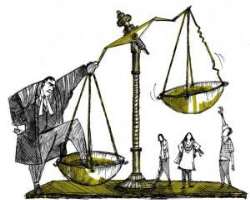Nigerian Judiciary: Year of Confusion

"The bedrock of our democracy is the rule of law and that means we have to have an independent judiciary, judges who can make decisions independent of the political winds that are blowing." - Caroline Kennedy
The judicial absurdity that's flowing in the Nigerian polity this very moment is not only appalling, but it's also nauseating and gives off a putrid odour, too poisonous to behold. Friends, in all sincerity, once again, we're at another critical point in our national history where we must begin to ask ourselves sensitive questions and demand for rapid response from the Judicial arm of our nascent democracy. In view of recent happenings, can we still trust in the integrity of the Nigerian Judiciary? Can our courts still be referred to as the temple of justice? Are Judges still our honourable Lords? Is the judiciary still the last hope of the common man?
For quite a while now, the magnitude of confusion that has emanated from the hallowed chamber of the Federal High Court is something to be deeply worried about. I am afraid for the mental health of my fellow Nigerians; I am scared of what the aftermath of this judicial chaos will bring; I see anarchy being watered by the fountain of law and order. This mess is too slippery to contain, too disgusting to fathom, and too irritating to accommodate. Clearly, the Nigerian Judiciary is falling, failing, and fading away into an oblivious vacuum of mediocrity.
Do we have two Federal High Courts in Nigeria? Is it normal for two branches of the Federal High Court of Nigeria to keep issuing out orders and counter orders on a particular matter in court? Is this a normal judicial practice in saner climes? Obviously, these questions are part of a set of questions that we must begin to ask those who are at the helm of affairs in our nation's Judiciary. The current unhealthy exchanges between courts of coordinate jurisdiction in Abuja, Port Harcourt, and Lagos, respectively, has almost destroyed whatever faith that yet lingers in our beings for the Nigerian Judiciary.
Without going into details on the legal tussle between the Sheriff-led faction and the Markarfi-led faction of the PDP, since the matter is pending in court, still, it is imperative to note that so far, the confusion that has been generated by the conflicting judgements from the Federal High Court in Port Harcourt, Lagos, and Abuja respectively, is enough to destabilise the very fragile peace that still exists in our country at the moment. For example, now that we have two different judgements from the same Federal High Court on the issue of the legality or not of the planned August 17 (2016) PDP Port Harcourt Convention, what should both parties do?
Judging from the antecedents of the players in the Markafi-led faction, it is most likely they will go ahead with the Port Harcourt Convention on the grounds of a court judgement gotten from the Port Harcourt division of the Federal High Court, which directed the police and other security agencies to provide security for the proposed gathering, thereby legitimising it. It is also possible that the financially strong Sheriff-led faction of the PDP might be mobilising a protest against any action that will disobey another judgement gotten from the Abuja division of the same Federal High Court, which declared the planned Port Harcourt Convention illegal, and also granted an interim injunction against the controversial event. Is this not enough to ignite bloodshed in the insecurity ridden Rivers State? Will the Police and other security agencies standby and watch this imminent threat to the peace and well being of Rivers people?
The current happenings in the Nigerian Judiciary reminds me of the words of Pierre-Joseph Proudhon, a French politician, founder of mutualist philosophy, and the first person to declare himself an anarchist: "Laws: We know what they are, and what they are worth! They are spider webs for the rich and mighty, steel chains for the poor and weak, fishing nets in the hands of the government." Is this now our reality? What is the solution to this conspicuous Judicial deformity in Nigeria?
The National Judicial Council (NJC), which was created in accordance with the provisions of Section 153 of the 1999 Constitution as amended, has so far woefully failed in its disciplinary responsibility. One would have expected the NJC to wield its constitutional power and bring an urgent halt to the ongoing desecration of the judiciary in Nigeria. Alas, that is not to be! Perhaps, the NJC, indeed the Nigerian Judiciary, has endorsed 2016 as the year of judicial confusion in Nigeria.
~ Solomon Okocha
okocha_info, [email protected]
